The Role of Teaching and Assessment in Child Development (Psychology)
VerifiedAdded on 2023/06/04
|10
|2510
|283
Essay
AI Summary
This essay delves into the critical role of teaching and assessment in the learning and development of young children. It emphasizes the significance of educators in imparting knowledge and fostering growth, supported by research highlighting the importance of teaching methods and assessment techniques. The essay explores the practical application of various pedagogical approaches, including Piaget's and Vygotsky's theories, while also providing a critique of contemporary teaching practices, such as play-based and strength-based approaches. Furthermore, it underscores the professional and ethical responsibilities of teachers in both teaching and assessment, emphasizing the need for ethical considerations and the importance of regular evaluation. The conclusion reinforces the crucial role of teachers and the positive impact of effective pedagogical strategies and assessment practices on the future development of children.
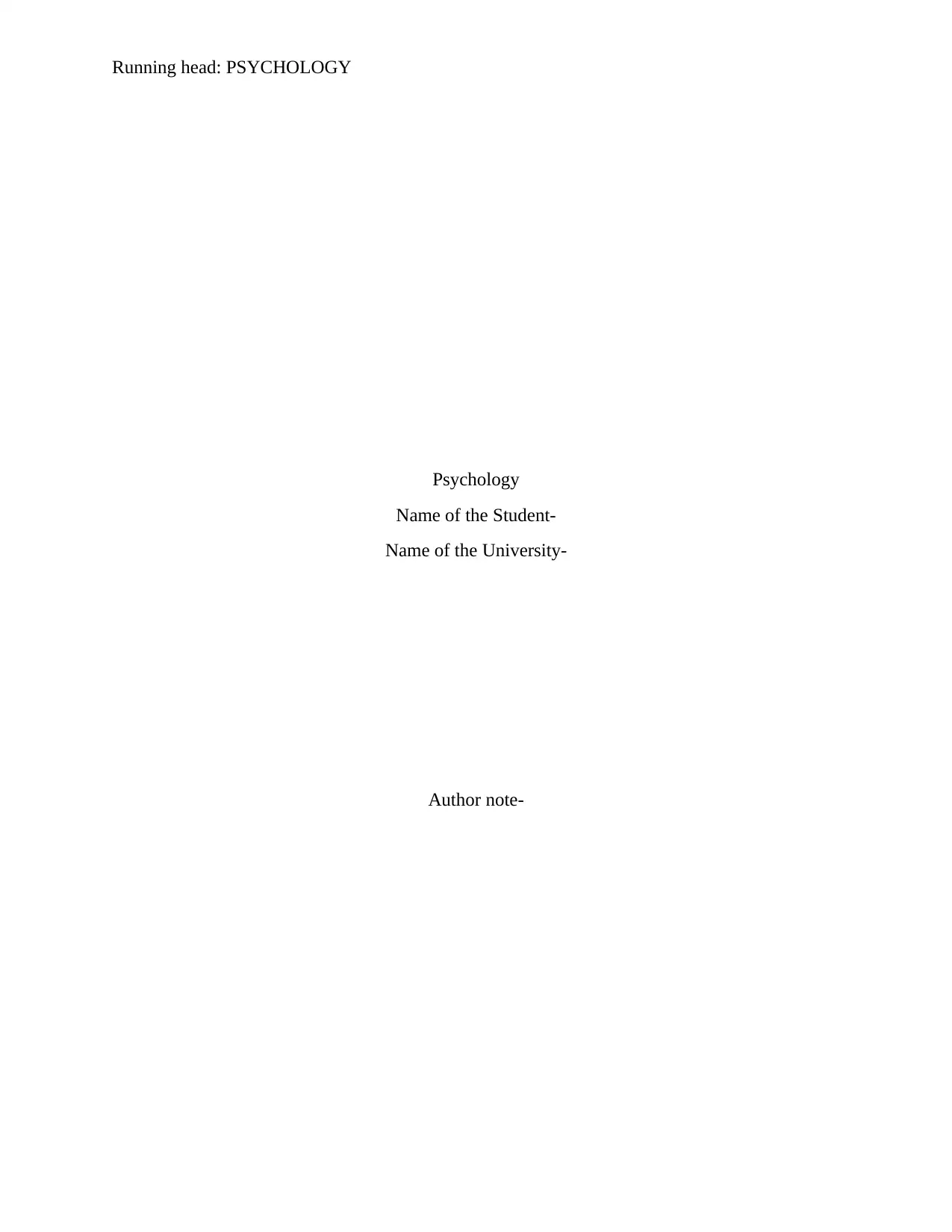
Running head: PSYCHOLOGY
Psychology
Name of the Student-
Name of the University-
Author note-
Psychology
Name of the Student-
Name of the University-
Author note-
Paraphrase This Document
Need a fresh take? Get an instant paraphrase of this document with our AI Paraphraser
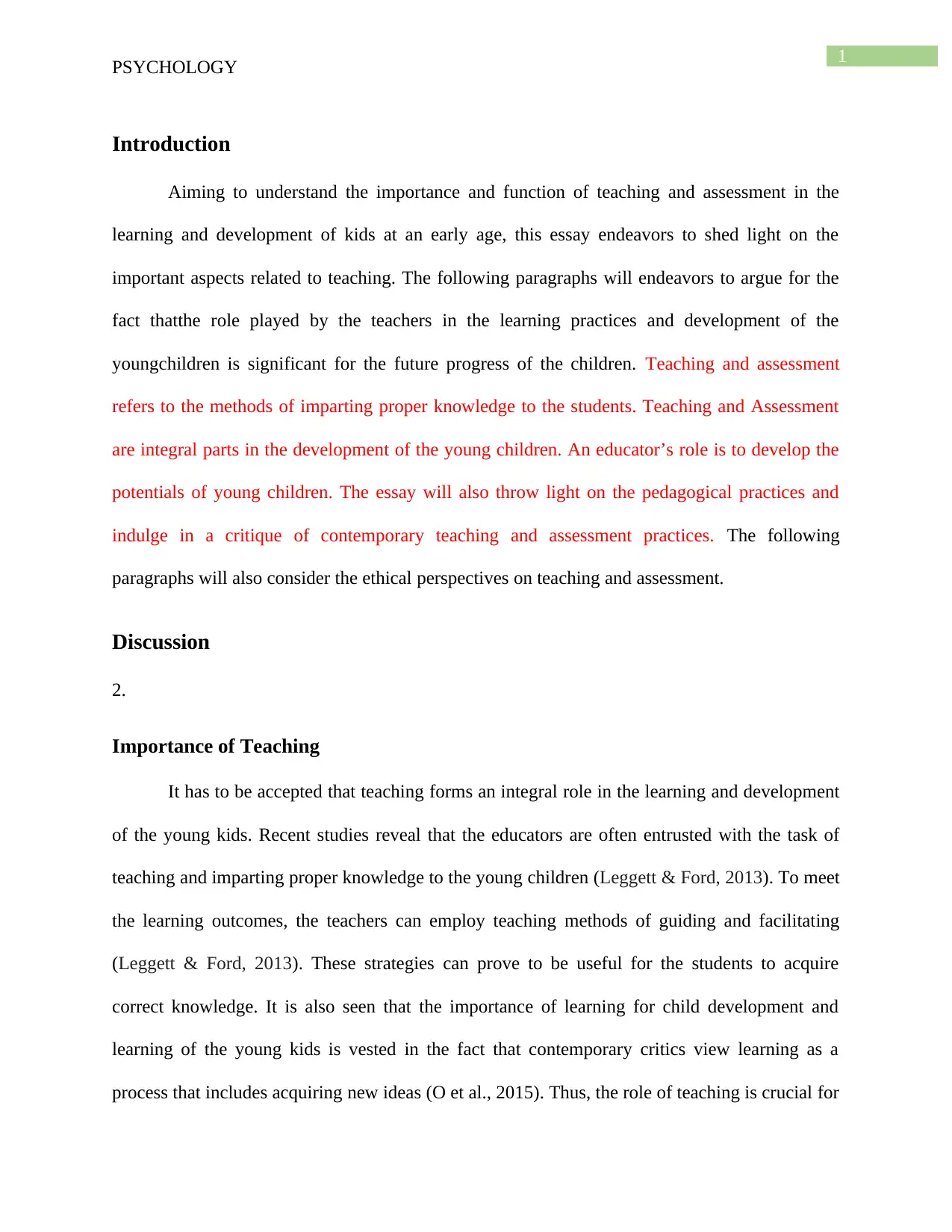
1
PSYCHOLOGY
Introduction
Aiming to understand the importance and function of teaching and assessment in the
learning and development of kids at an early age, this essay endeavors to shed light on the
important aspects related to teaching. The following paragraphs will endeavors to argue for the
fact thatthe role played by the teachers in the learning practices and development of the
youngchildren is significant for the future progress of the children. Teaching and assessment
refers to the methods of imparting proper knowledge to the students. Teaching and Assessment
are integral parts in the development of the young children. An educator’s role is to develop the
potentials of young children. The essay will also throw light on the pedagogical practices and
indulge in a critique of contemporary teaching and assessment practices. The following
paragraphs will also consider the ethical perspectives on teaching and assessment.
Discussion
2.
Importance of Teaching
It has to be accepted that teaching forms an integral role in the learning and development
of the young kids. Recent studies reveal that the educators are often entrusted with the task of
teaching and imparting proper knowledge to the young children (Leggett & Ford, 2013). To meet
the learning outcomes, the teachers can employ teaching methods of guiding and facilitating
(Leggett & Ford, 2013). These strategies can prove to be useful for the students to acquire
correct knowledge. It is also seen that the importance of learning for child development and
learning of the young kids is vested in the fact that contemporary critics view learning as a
process that includes acquiring new ideas (O et al., 2015). Thus, the role of teaching is crucial for
PSYCHOLOGY
Introduction
Aiming to understand the importance and function of teaching and assessment in the
learning and development of kids at an early age, this essay endeavors to shed light on the
important aspects related to teaching. The following paragraphs will endeavors to argue for the
fact thatthe role played by the teachers in the learning practices and development of the
youngchildren is significant for the future progress of the children. Teaching and assessment
refers to the methods of imparting proper knowledge to the students. Teaching and Assessment
are integral parts in the development of the young children. An educator’s role is to develop the
potentials of young children. The essay will also throw light on the pedagogical practices and
indulge in a critique of contemporary teaching and assessment practices. The following
paragraphs will also consider the ethical perspectives on teaching and assessment.
Discussion
2.
Importance of Teaching
It has to be accepted that teaching forms an integral role in the learning and development
of the young kids. Recent studies reveal that the educators are often entrusted with the task of
teaching and imparting proper knowledge to the young children (Leggett & Ford, 2013). To meet
the learning outcomes, the teachers can employ teaching methods of guiding and facilitating
(Leggett & Ford, 2013). These strategies can prove to be useful for the students to acquire
correct knowledge. It is also seen that the importance of learning for child development and
learning of the young kids is vested in the fact that contemporary critics view learning as a
process that includes acquiring new ideas (O et al., 2015). Thus, the role of teaching is crucial for
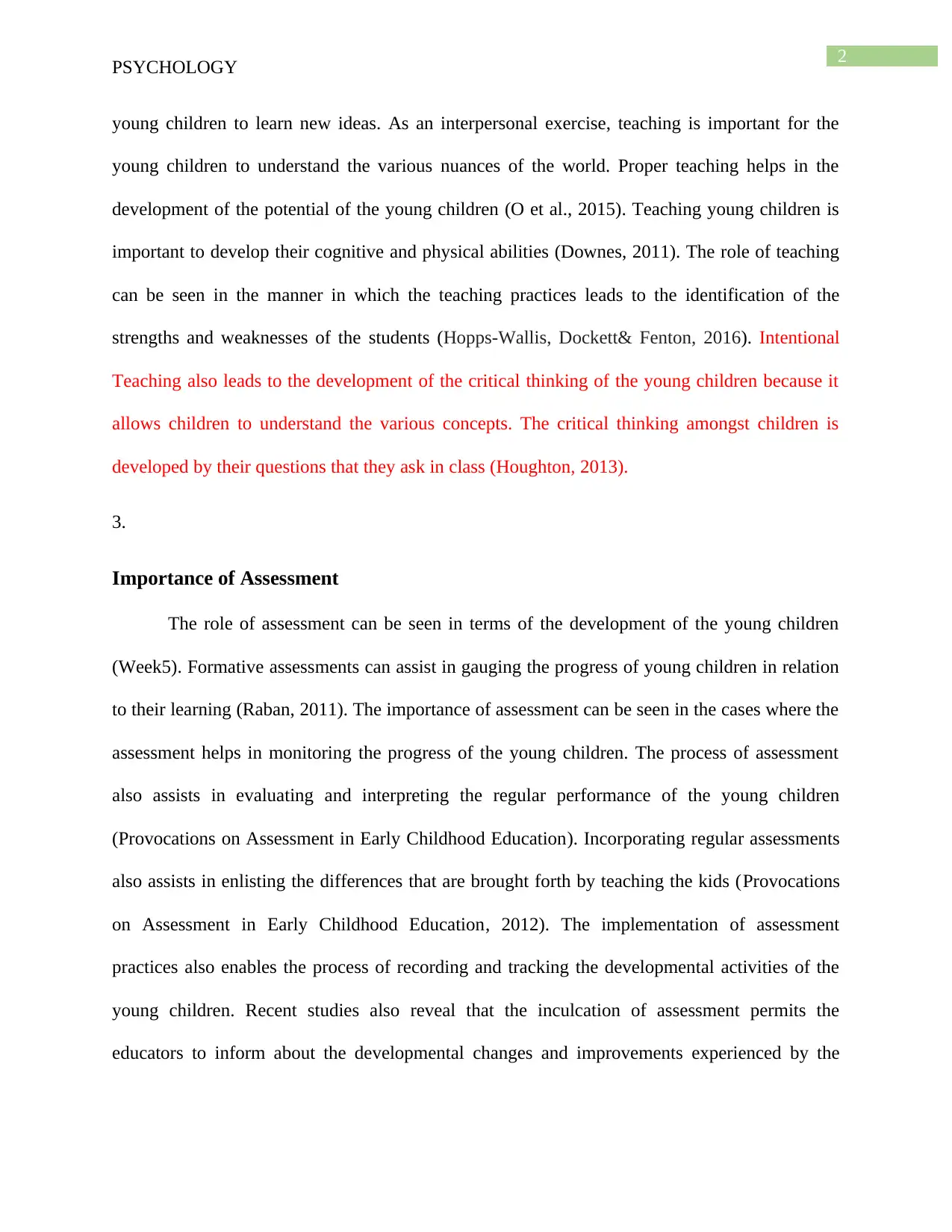
2
PSYCHOLOGY
young children to learn new ideas. As an interpersonal exercise, teaching is important for the
young children to understand the various nuances of the world. Proper teaching helps in the
development of the potential of the young children (O et al., 2015). Teaching young children is
important to develop their cognitive and physical abilities (Downes, 2011). The role of teaching
can be seen in the manner in which the teaching practices leads to the identification of the
strengths and weaknesses of the students (Hopps-Wallis, Dockett& Fenton, 2016). Intentional
Teaching also leads to the development of the critical thinking of the young children because it
allows children to understand the various concepts. The critical thinking amongst children is
developed by their questions that they ask in class (Houghton, 2013).
3.
Importance of Assessment
The role of assessment can be seen in terms of the development of the young children
(Week5). Formative assessments can assist in gauging the progress of young children in relation
to their learning (Raban, 2011). The importance of assessment can be seen in the cases where the
assessment helps in monitoring the progress of the young children. The process of assessment
also assists in evaluating and interpreting the regular performance of the young children
(Provocations on Assessment in Early Childhood Education). Incorporating regular assessments
also assists in enlisting the differences that are brought forth by teaching the kids (Provocations
on Assessment in Early Childhood Education, 2012). The implementation of assessment
practices also enables the process of recording and tracking the developmental activities of the
young children. Recent studies also reveal that the inculcation of assessment permits the
educators to inform about the developmental changes and improvements experienced by the
PSYCHOLOGY
young children to learn new ideas. As an interpersonal exercise, teaching is important for the
young children to understand the various nuances of the world. Proper teaching helps in the
development of the potential of the young children (O et al., 2015). Teaching young children is
important to develop their cognitive and physical abilities (Downes, 2011). The role of teaching
can be seen in the manner in which the teaching practices leads to the identification of the
strengths and weaknesses of the students (Hopps-Wallis, Dockett& Fenton, 2016). Intentional
Teaching also leads to the development of the critical thinking of the young children because it
allows children to understand the various concepts. The critical thinking amongst children is
developed by their questions that they ask in class (Houghton, 2013).
3.
Importance of Assessment
The role of assessment can be seen in terms of the development of the young children
(Week5). Formative assessments can assist in gauging the progress of young children in relation
to their learning (Raban, 2011). The importance of assessment can be seen in the cases where the
assessment helps in monitoring the progress of the young children. The process of assessment
also assists in evaluating and interpreting the regular performance of the young children
(Provocations on Assessment in Early Childhood Education). Incorporating regular assessments
also assists in enlisting the differences that are brought forth by teaching the kids (Provocations
on Assessment in Early Childhood Education, 2012). The implementation of assessment
practices also enables the process of recording and tracking the developmental activities of the
young children. Recent studies also reveal that the inculcation of assessment permits the
educators to inform about the developmental changes and improvements experienced by the
⊘ This is a preview!⊘
Do you want full access?
Subscribe today to unlock all pages.

Trusted by 1+ million students worldwide
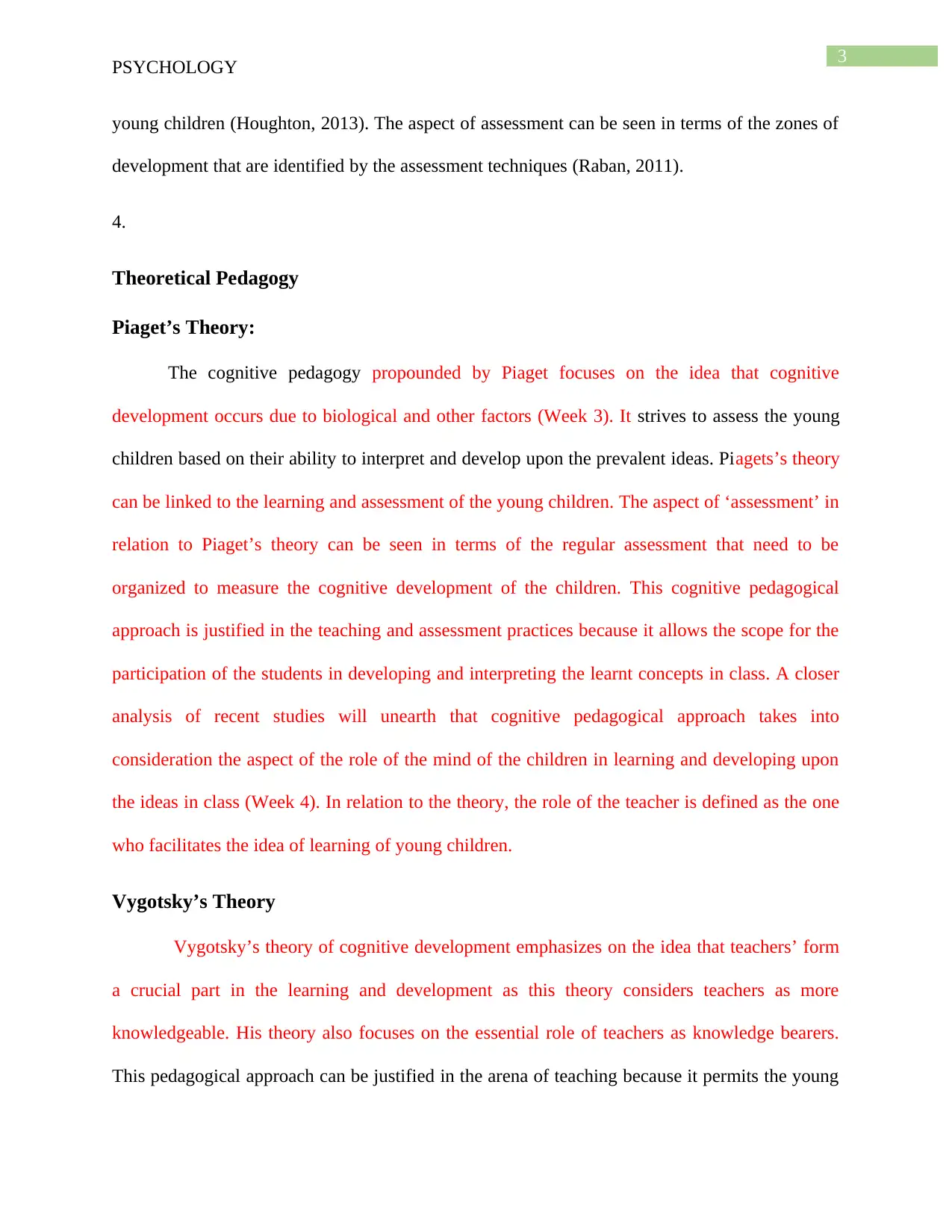
3
PSYCHOLOGY
young children (Houghton, 2013). The aspect of assessment can be seen in terms of the zones of
development that are identified by the assessment techniques (Raban, 2011).
4.
Theoretical Pedagogy
Piaget’s Theory:
The cognitive pedagogy propounded by Piaget focuses on the idea that cognitive
development occurs due to biological and other factors (Week 3). It strives to assess the young
children based on their ability to interpret and develop upon the prevalent ideas. Piagets’s theory
can be linked to the learning and assessment of the young children. The aspect of ‘assessment’ in
relation to Piaget’s theory can be seen in terms of the regular assessment that need to be
organized to measure the cognitive development of the children. This cognitive pedagogical
approach is justified in the teaching and assessment practices because it allows the scope for the
participation of the students in developing and interpreting the learnt concepts in class. A closer
analysis of recent studies will unearth that cognitive pedagogical approach takes into
consideration the aspect of the role of the mind of the children in learning and developing upon
the ideas in class (Week 4). In relation to the theory, the role of the teacher is defined as the one
who facilitates the idea of learning of young children.
Vygotsky’s Theory
Vygotsky’s theory of cognitive development emphasizes on the idea that teachers’ form
a crucial part in the learning and development as this theory considers teachers as more
knowledgeable. His theory also focuses on the essential role of teachers as knowledge bearers.
This pedagogical approach can be justified in the arena of teaching because it permits the young
PSYCHOLOGY
young children (Houghton, 2013). The aspect of assessment can be seen in terms of the zones of
development that are identified by the assessment techniques (Raban, 2011).
4.
Theoretical Pedagogy
Piaget’s Theory:
The cognitive pedagogy propounded by Piaget focuses on the idea that cognitive
development occurs due to biological and other factors (Week 3). It strives to assess the young
children based on their ability to interpret and develop upon the prevalent ideas. Piagets’s theory
can be linked to the learning and assessment of the young children. The aspect of ‘assessment’ in
relation to Piaget’s theory can be seen in terms of the regular assessment that need to be
organized to measure the cognitive development of the children. This cognitive pedagogical
approach is justified in the teaching and assessment practices because it allows the scope for the
participation of the students in developing and interpreting the learnt concepts in class. A closer
analysis of recent studies will unearth that cognitive pedagogical approach takes into
consideration the aspect of the role of the mind of the children in learning and developing upon
the ideas in class (Week 4). In relation to the theory, the role of the teacher is defined as the one
who facilitates the idea of learning of young children.
Vygotsky’s Theory
Vygotsky’s theory of cognitive development emphasizes on the idea that teachers’ form
a crucial part in the learning and development as this theory considers teachers as more
knowledgeable. His theory also focuses on the essential role of teachers as knowledge bearers.
This pedagogical approach can be justified in the arena of teaching because it permits the young
Paraphrase This Document
Need a fresh take? Get an instant paraphrase of this document with our AI Paraphraser
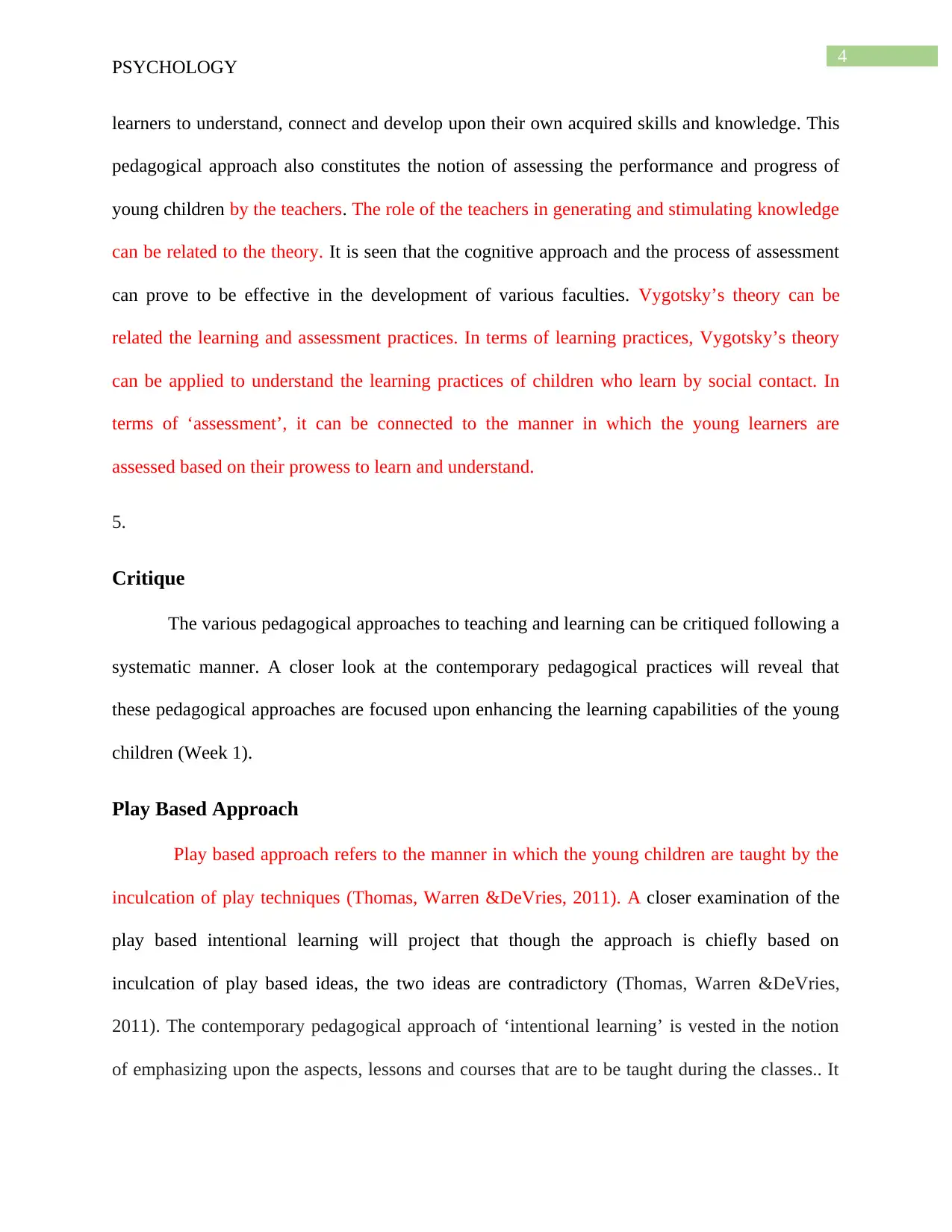
4
PSYCHOLOGY
learners to understand, connect and develop upon their own acquired skills and knowledge. This
pedagogical approach also constitutes the notion of assessing the performance and progress of
young children by the teachers. The role of the teachers in generating and stimulating knowledge
can be related to the theory. It is seen that the cognitive approach and the process of assessment
can prove to be effective in the development of various faculties. Vygotsky’s theory can be
related the learning and assessment practices. In terms of learning practices, Vygotsky’s theory
can be applied to understand the learning practices of children who learn by social contact. In
terms of ‘assessment’, it can be connected to the manner in which the young learners are
assessed based on their prowess to learn and understand.
5.
Critique
The various pedagogical approaches to teaching and learning can be critiqued following a
systematic manner. A closer look at the contemporary pedagogical practices will reveal that
these pedagogical approaches are focused upon enhancing the learning capabilities of the young
children (Week 1).
Play Based Approach
Play based approach refers to the manner in which the young children are taught by the
inculcation of play techniques (Thomas, Warren &DeVries, 2011). A closer examination of the
play based intentional learning will project that though the approach is chiefly based on
inculcation of play based ideas, the two ideas are contradictory (Thomas, Warren &DeVries,
2011). The contemporary pedagogical approach of ‘intentional learning’ is vested in the notion
of emphasizing upon the aspects, lessons and courses that are to be taught during the classes.. It
PSYCHOLOGY
learners to understand, connect and develop upon their own acquired skills and knowledge. This
pedagogical approach also constitutes the notion of assessing the performance and progress of
young children by the teachers. The role of the teachers in generating and stimulating knowledge
can be related to the theory. It is seen that the cognitive approach and the process of assessment
can prove to be effective in the development of various faculties. Vygotsky’s theory can be
related the learning and assessment practices. In terms of learning practices, Vygotsky’s theory
can be applied to understand the learning practices of children who learn by social contact. In
terms of ‘assessment’, it can be connected to the manner in which the young learners are
assessed based on their prowess to learn and understand.
5.
Critique
The various pedagogical approaches to teaching and learning can be critiqued following a
systematic manner. A closer look at the contemporary pedagogical practices will reveal that
these pedagogical approaches are focused upon enhancing the learning capabilities of the young
children (Week 1).
Play Based Approach
Play based approach refers to the manner in which the young children are taught by the
inculcation of play techniques (Thomas, Warren &DeVries, 2011). A closer examination of the
play based intentional learning will project that though the approach is chiefly based on
inculcation of play based ideas, the two ideas are contradictory (Thomas, Warren &DeVries,
2011). The contemporary pedagogical approach of ‘intentional learning’ is vested in the notion
of emphasizing upon the aspects, lessons and courses that are to be taught during the classes.. It
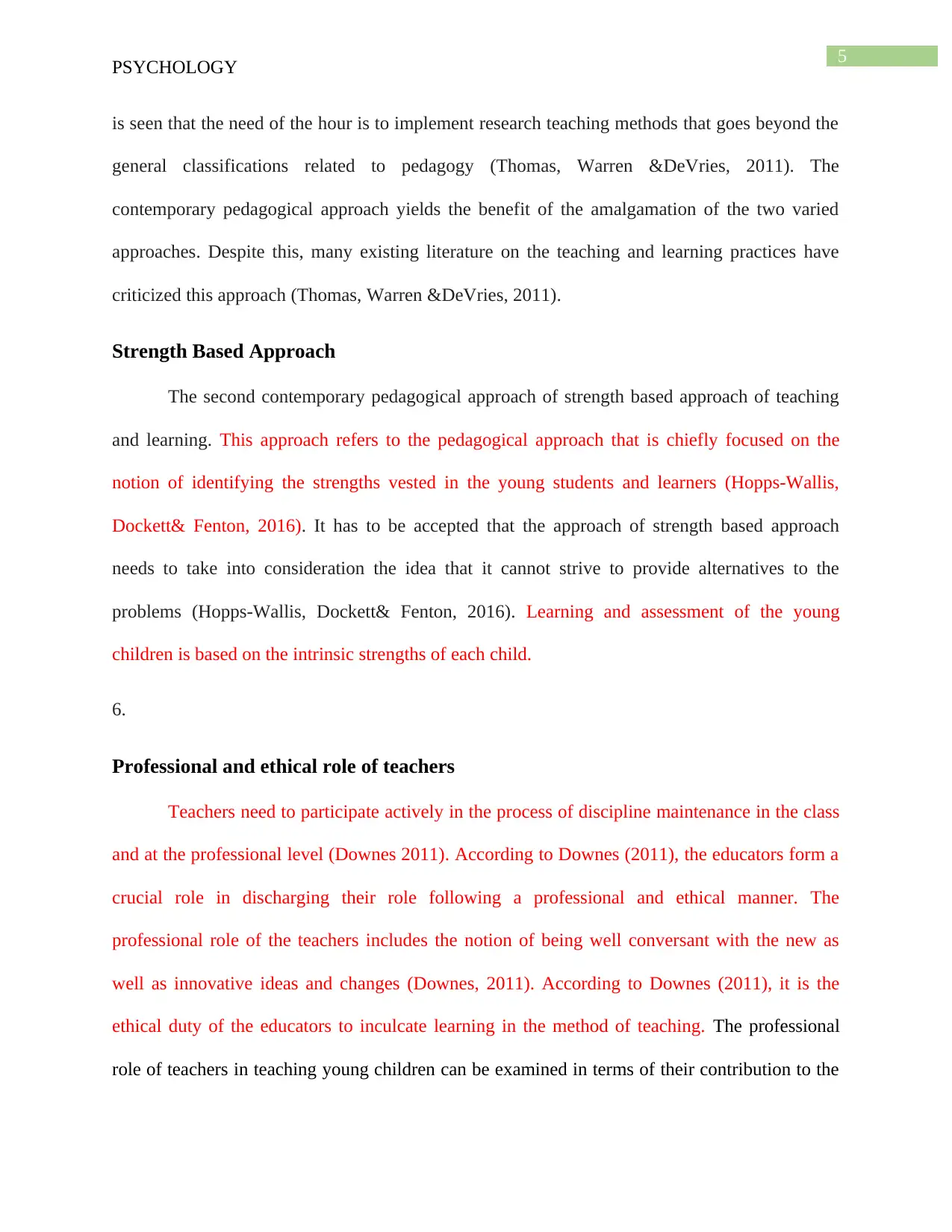
5
PSYCHOLOGY
is seen that the need of the hour is to implement research teaching methods that goes beyond the
general classifications related to pedagogy (Thomas, Warren &DeVries, 2011). The
contemporary pedagogical approach yields the benefit of the amalgamation of the two varied
approaches. Despite this, many existing literature on the teaching and learning practices have
criticized this approach (Thomas, Warren &DeVries, 2011).
Strength Based Approach
The second contemporary pedagogical approach of strength based approach of teaching
and learning. This approach refers to the pedagogical approach that is chiefly focused on the
notion of identifying the strengths vested in the young students and learners (Hopps-Wallis,
Dockett& Fenton, 2016). It has to be accepted that the approach of strength based approach
needs to take into consideration the idea that it cannot strive to provide alternatives to the
problems (Hopps-Wallis, Dockett& Fenton, 2016). Learning and assessment of the young
children is based on the intrinsic strengths of each child.
6.
Professional and ethical role of teachers
Teachers need to participate actively in the process of discipline maintenance in the class
and at the professional level (Downes 2011). According to Downes (2011), the educators form a
crucial role in discharging their role following a professional and ethical manner. The
professional role of the teachers includes the notion of being well conversant with the new as
well as innovative ideas and changes (Downes, 2011). According to Downes (2011), it is the
ethical duty of the educators to inculcate learning in the method of teaching. The professional
role of teachers in teaching young children can be examined in terms of their contribution to the
PSYCHOLOGY
is seen that the need of the hour is to implement research teaching methods that goes beyond the
general classifications related to pedagogy (Thomas, Warren &DeVries, 2011). The
contemporary pedagogical approach yields the benefit of the amalgamation of the two varied
approaches. Despite this, many existing literature on the teaching and learning practices have
criticized this approach (Thomas, Warren &DeVries, 2011).
Strength Based Approach
The second contemporary pedagogical approach of strength based approach of teaching
and learning. This approach refers to the pedagogical approach that is chiefly focused on the
notion of identifying the strengths vested in the young students and learners (Hopps-Wallis,
Dockett& Fenton, 2016). It has to be accepted that the approach of strength based approach
needs to take into consideration the idea that it cannot strive to provide alternatives to the
problems (Hopps-Wallis, Dockett& Fenton, 2016). Learning and assessment of the young
children is based on the intrinsic strengths of each child.
6.
Professional and ethical role of teachers
Teachers need to participate actively in the process of discipline maintenance in the class
and at the professional level (Downes 2011). According to Downes (2011), the educators form a
crucial role in discharging their role following a professional and ethical manner. The
professional role of the teachers includes the notion of being well conversant with the new as
well as innovative ideas and changes (Downes, 2011). According to Downes (2011), it is the
ethical duty of the educators to inculcate learning in the method of teaching. The professional
role of teachers in teaching young children can be examined in terms of their contribution to the
⊘ This is a preview!⊘
Do you want full access?
Subscribe today to unlock all pages.

Trusted by 1+ million students worldwide
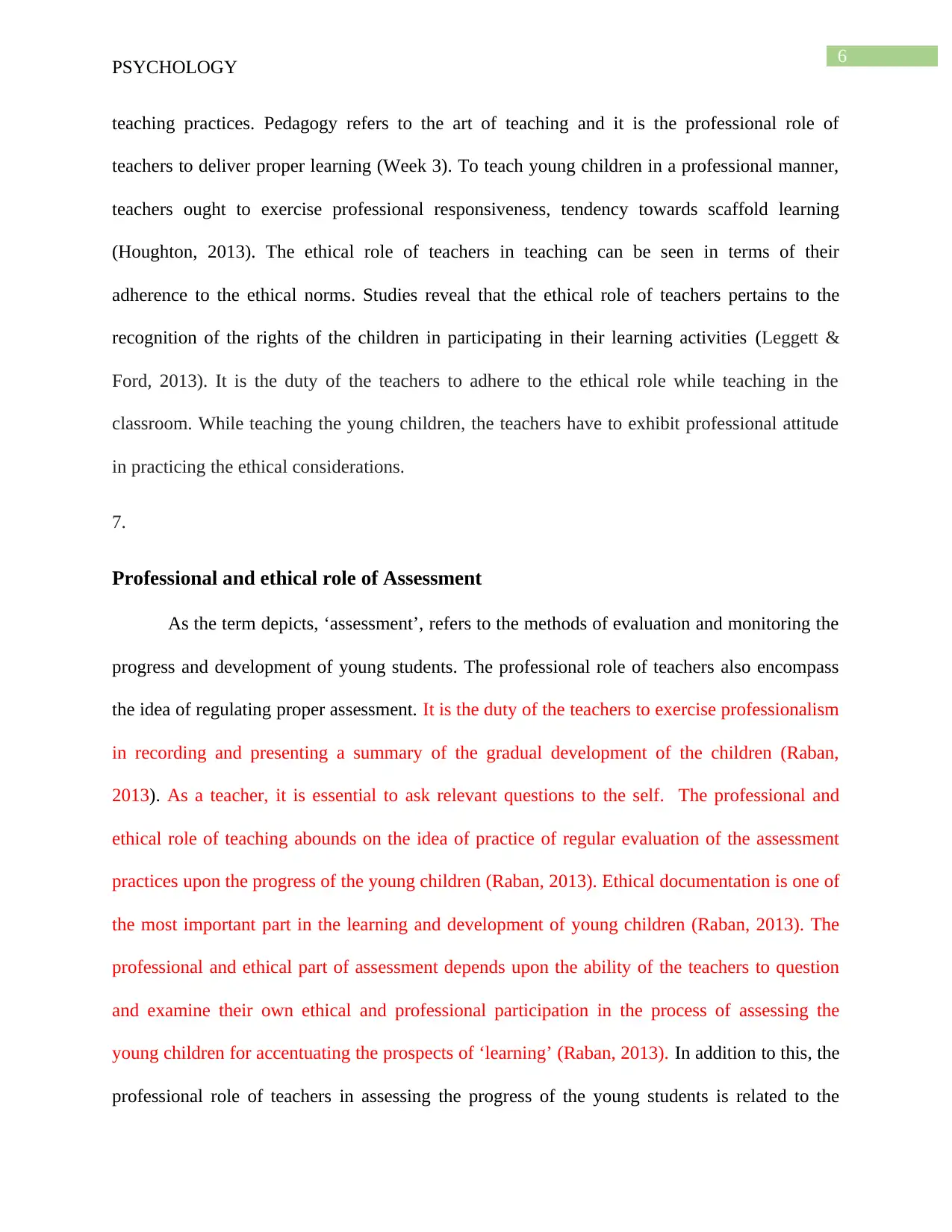
6
PSYCHOLOGY
teaching practices. Pedagogy refers to the art of teaching and it is the professional role of
teachers to deliver proper learning (Week 3). To teach young children in a professional manner,
teachers ought to exercise professional responsiveness, tendency towards scaffold learning
(Houghton, 2013). The ethical role of teachers in teaching can be seen in terms of their
adherence to the ethical norms. Studies reveal that the ethical role of teachers pertains to the
recognition of the rights of the children in participating in their learning activities (Leggett &
Ford, 2013). It is the duty of the teachers to adhere to the ethical role while teaching in the
classroom. While teaching the young children, the teachers have to exhibit professional attitude
in practicing the ethical considerations.
7.
Professional and ethical role of Assessment
As the term depicts, ‘assessment’, refers to the methods of evaluation and monitoring the
progress and development of young students. The professional role of teachers also encompass
the idea of regulating proper assessment. It is the duty of the teachers to exercise professionalism
in recording and presenting a summary of the gradual development of the children (Raban,
2013). As a teacher, it is essential to ask relevant questions to the self. The professional and
ethical role of teaching abounds on the idea of practice of regular evaluation of the assessment
practices upon the progress of the young children (Raban, 2013). Ethical documentation is one of
the most important part in the learning and development of young children (Raban, 2013). The
professional and ethical part of assessment depends upon the ability of the teachers to question
and examine their own ethical and professional participation in the process of assessing the
young children for accentuating the prospects of ‘learning’ (Raban, 2013). In addition to this, the
professional role of teachers in assessing the progress of the young students is related to the
PSYCHOLOGY
teaching practices. Pedagogy refers to the art of teaching and it is the professional role of
teachers to deliver proper learning (Week 3). To teach young children in a professional manner,
teachers ought to exercise professional responsiveness, tendency towards scaffold learning
(Houghton, 2013). The ethical role of teachers in teaching can be seen in terms of their
adherence to the ethical norms. Studies reveal that the ethical role of teachers pertains to the
recognition of the rights of the children in participating in their learning activities (Leggett &
Ford, 2013). It is the duty of the teachers to adhere to the ethical role while teaching in the
classroom. While teaching the young children, the teachers have to exhibit professional attitude
in practicing the ethical considerations.
7.
Professional and ethical role of Assessment
As the term depicts, ‘assessment’, refers to the methods of evaluation and monitoring the
progress and development of young students. The professional role of teachers also encompass
the idea of regulating proper assessment. It is the duty of the teachers to exercise professionalism
in recording and presenting a summary of the gradual development of the children (Raban,
2013). As a teacher, it is essential to ask relevant questions to the self. The professional and
ethical role of teaching abounds on the idea of practice of regular evaluation of the assessment
practices upon the progress of the young children (Raban, 2013). Ethical documentation is one of
the most important part in the learning and development of young children (Raban, 2013). The
professional and ethical part of assessment depends upon the ability of the teachers to question
and examine their own ethical and professional participation in the process of assessing the
young children for accentuating the prospects of ‘learning’ (Raban, 2013). In addition to this, the
professional role of teachers in assessing the progress of the young students is related to the
Paraphrase This Document
Need a fresh take? Get an instant paraphrase of this document with our AI Paraphraser
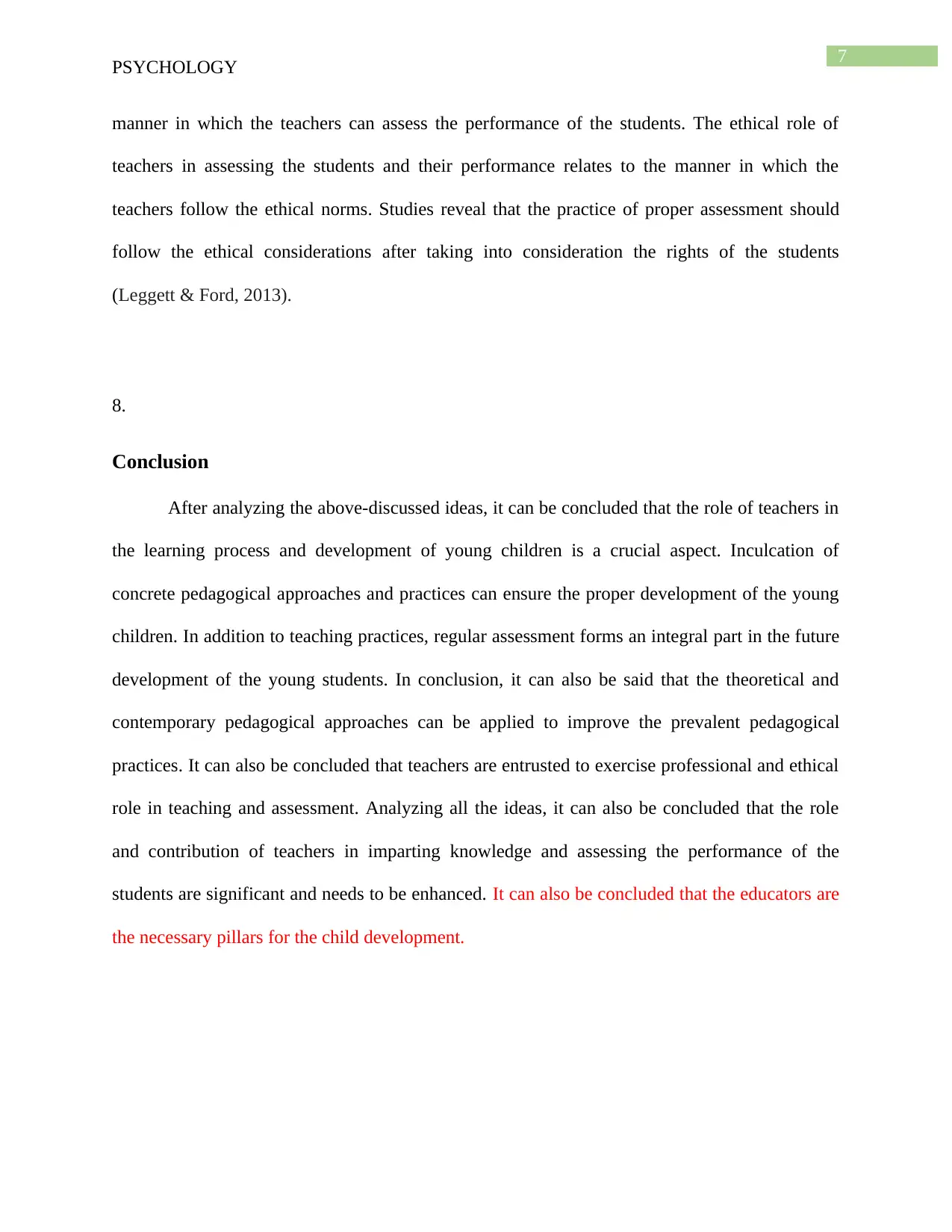
7
PSYCHOLOGY
manner in which the teachers can assess the performance of the students. The ethical role of
teachers in assessing the students and their performance relates to the manner in which the
teachers follow the ethical norms. Studies reveal that the practice of proper assessment should
follow the ethical considerations after taking into consideration the rights of the students
(Leggett & Ford, 2013).
8.
Conclusion
After analyzing the above-discussed ideas, it can be concluded that the role of teachers in
the learning process and development of young children is a crucial aspect. Inculcation of
concrete pedagogical approaches and practices can ensure the proper development of the young
children. In addition to teaching practices, regular assessment forms an integral part in the future
development of the young students. In conclusion, it can also be said that the theoretical and
contemporary pedagogical approaches can be applied to improve the prevalent pedagogical
practices. It can also be concluded that teachers are entrusted to exercise professional and ethical
role in teaching and assessment. Analyzing all the ideas, it can also be concluded that the role
and contribution of teachers in imparting knowledge and assessing the performance of the
students are significant and needs to be enhanced. It can also be concluded that the educators are
the necessary pillars for the child development.
PSYCHOLOGY
manner in which the teachers can assess the performance of the students. The ethical role of
teachers in assessing the students and their performance relates to the manner in which the
teachers follow the ethical norms. Studies reveal that the practice of proper assessment should
follow the ethical considerations after taking into consideration the rights of the students
(Leggett & Ford, 2013).
8.
Conclusion
After analyzing the above-discussed ideas, it can be concluded that the role of teachers in
the learning process and development of young children is a crucial aspect. Inculcation of
concrete pedagogical approaches and practices can ensure the proper development of the young
children. In addition to teaching practices, regular assessment forms an integral part in the future
development of the young students. In conclusion, it can also be said that the theoretical and
contemporary pedagogical approaches can be applied to improve the prevalent pedagogical
practices. It can also be concluded that teachers are entrusted to exercise professional and ethical
role in teaching and assessment. Analyzing all the ideas, it can also be concluded that the role
and contribution of teachers in imparting knowledge and assessing the performance of the
students are significant and needs to be enhanced. It can also be concluded that the educators are
the necessary pillars for the child development.
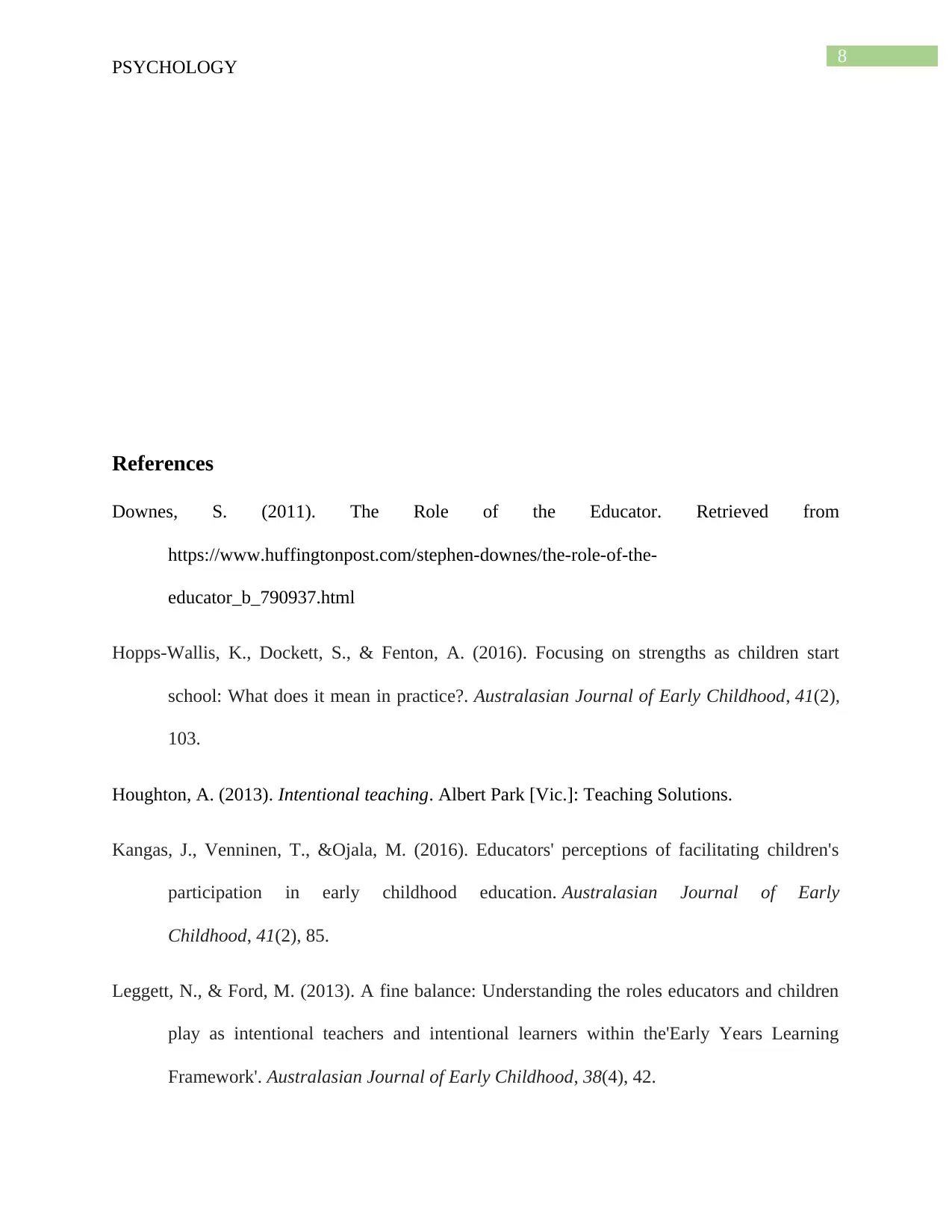
8
PSYCHOLOGY
References
Downes, S. (2011). The Role of the Educator. Retrieved from
https://www.huffingtonpost.com/stephen-downes/the-role-of-the-
educator_b_790937.html
Hopps-Wallis, K., Dockett, S., & Fenton, A. (2016). Focusing on strengths as children start
school: What does it mean in practice?. Australasian Journal of Early Childhood, 41(2),
103.
Houghton, A. (2013). Intentional teaching. Albert Park [Vic.]: Teaching Solutions.
Kangas, J., Venninen, T., &Ojala, M. (2016). Educators' perceptions of facilitating children's
participation in early childhood education. Australasian Journal of Early
Childhood, 41(2), 85.
Leggett, N., & Ford, M. (2013). A fine balance: Understanding the roles educators and children
play as intentional teachers and intentional learners within the'Early Years Learning
Framework'. Australasian Journal of Early Childhood, 38(4), 42.
PSYCHOLOGY
References
Downes, S. (2011). The Role of the Educator. Retrieved from
https://www.huffingtonpost.com/stephen-downes/the-role-of-the-
educator_b_790937.html
Hopps-Wallis, K., Dockett, S., & Fenton, A. (2016). Focusing on strengths as children start
school: What does it mean in practice?. Australasian Journal of Early Childhood, 41(2),
103.
Houghton, A. (2013). Intentional teaching. Albert Park [Vic.]: Teaching Solutions.
Kangas, J., Venninen, T., &Ojala, M. (2016). Educators' perceptions of facilitating children's
participation in early childhood education. Australasian Journal of Early
Childhood, 41(2), 85.
Leggett, N., & Ford, M. (2013). A fine balance: Understanding the roles educators and children
play as intentional teachers and intentional learners within the'Early Years Learning
Framework'. Australasian Journal of Early Childhood, 38(4), 42.
⊘ This is a preview!⊘
Do you want full access?
Subscribe today to unlock all pages.

Trusted by 1+ million students worldwide
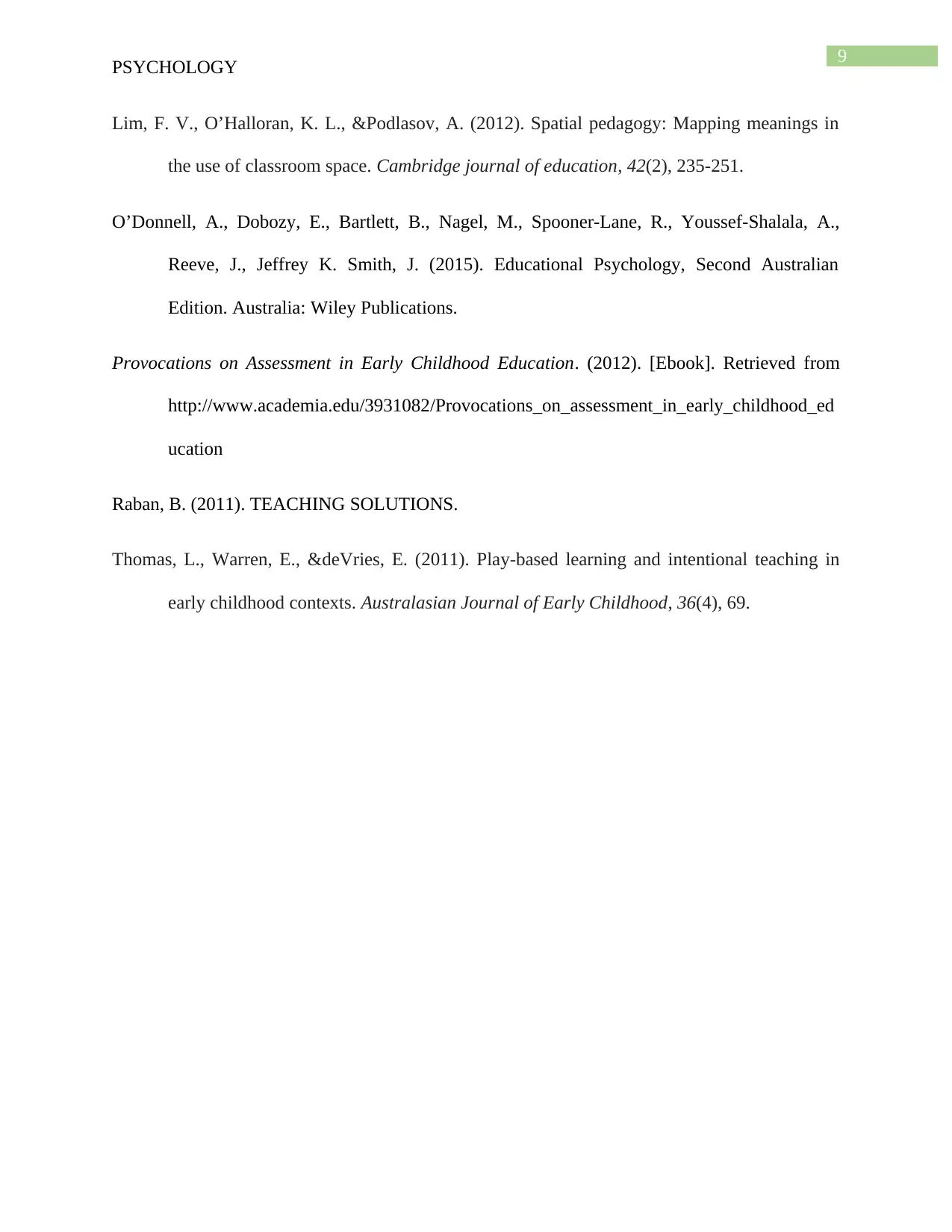
9
PSYCHOLOGY
Lim, F. V., O’Halloran, K. L., &Podlasov, A. (2012). Spatial pedagogy: Mapping meanings in
the use of classroom space. Cambridge journal of education, 42(2), 235-251.
O’Donnell, A., Dobozy, E., Bartlett, B., Nagel, M., Spooner-Lane, R., Youssef-Shalala, A.,
Reeve, J., Jeffrey K. Smith, J. (2015). Educational Psychology, Second Australian
Edition. Australia: Wiley Publications.
Provocations on Assessment in Early Childhood Education. (2012). [Ebook]. Retrieved from
http://www.academia.edu/3931082/Provocations_on_assessment_in_early_childhood_ed
ucation
Raban, B. (2011). TEACHING SOLUTIONS.
Thomas, L., Warren, E., &deVries, E. (2011). Play-based learning and intentional teaching in
early childhood contexts. Australasian Journal of Early Childhood, 36(4), 69.
PSYCHOLOGY
Lim, F. V., O’Halloran, K. L., &Podlasov, A. (2012). Spatial pedagogy: Mapping meanings in
the use of classroom space. Cambridge journal of education, 42(2), 235-251.
O’Donnell, A., Dobozy, E., Bartlett, B., Nagel, M., Spooner-Lane, R., Youssef-Shalala, A.,
Reeve, J., Jeffrey K. Smith, J. (2015). Educational Psychology, Second Australian
Edition. Australia: Wiley Publications.
Provocations on Assessment in Early Childhood Education. (2012). [Ebook]. Retrieved from
http://www.academia.edu/3931082/Provocations_on_assessment_in_early_childhood_ed
ucation
Raban, B. (2011). TEACHING SOLUTIONS.
Thomas, L., Warren, E., &deVries, E. (2011). Play-based learning and intentional teaching in
early childhood contexts. Australasian Journal of Early Childhood, 36(4), 69.
1 out of 10
Related Documents
Your All-in-One AI-Powered Toolkit for Academic Success.
+13062052269
info@desklib.com
Available 24*7 on WhatsApp / Email
![[object Object]](/_next/static/media/star-bottom.7253800d.svg)
Unlock your academic potential
Copyright © 2020–2025 A2Z Services. All Rights Reserved. Developed and managed by ZUCOL.





